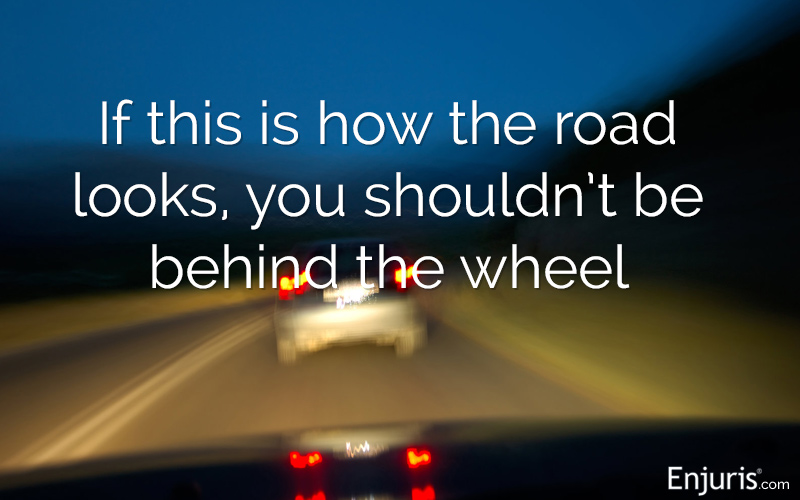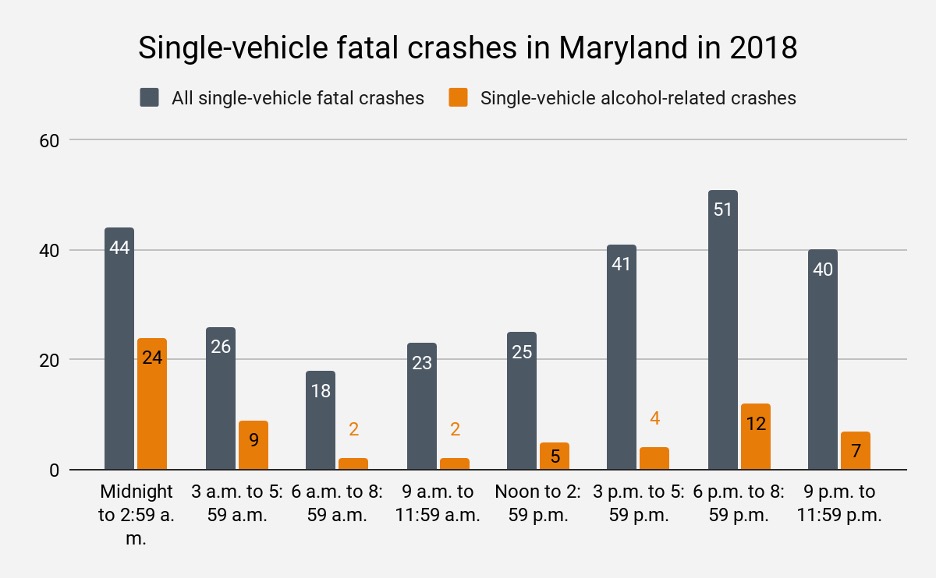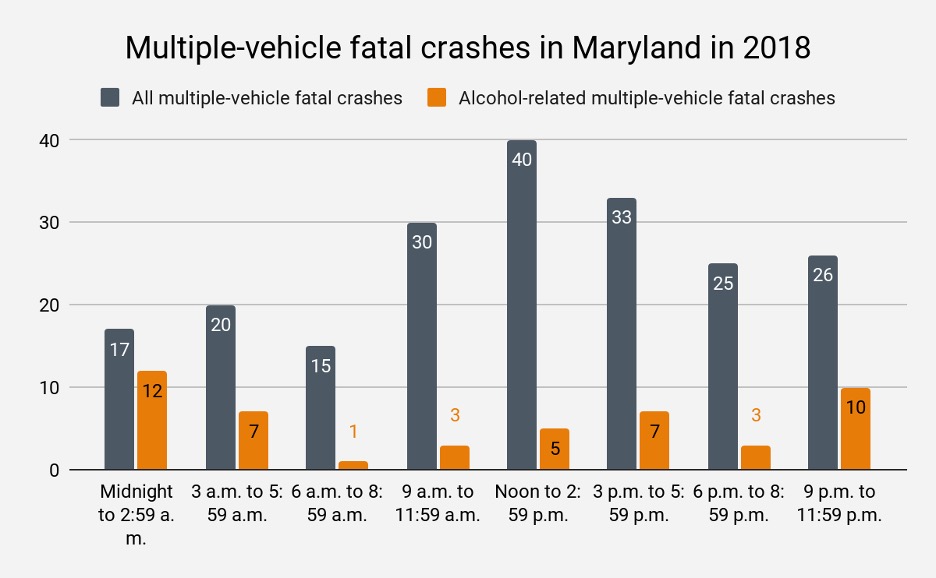
How to recover compensation following a car accident caused by a drunk driver
Nearly 30 people in the U.S. die in drunk driving crashes every day, which is more than 1 per hour.
That’s according to a report by the National Highway Traffic Safety Administration. In 2017, the most recent year of data, there were 186 alcohol-impaired driving fatalities in Maryland, compared to 343 non-alcohol-impaired driving fatalities. That equals more than one-third of Maryland traffic fatalities, or 35%.
Drinking and driving isn’t a victimless crime. While it’s true that many alcohol-related crashes involve a single vehicle—the impaired driver’s car—there are still far too many multi-vehicle wrecks.
Check out the 2 charts below to compare single-vehicle vs. multiple-vehicle alcohol-related fatal crashes in Maryland in 2018:


Maryland drunk driving laws
Maryland laws include DUI and DWI as separate offenses.
Maryland Driving Under the Influence (DUI)
A DUI is more severe than a DWI in Maryland. You can be charged with a DUI if your blood alcohol concentration (BAC) is .08% or higher. Maryland law calls this “under the influence per se.”
If you’re convicted of a DUI, you will receive 12 points on your license, which makes you eligible for license revocation.
Maryland Driving While Impaired (DWI)
Driving while impaired, or DWI, is a lesser charge than DUI. You can be charged with a DWI if your BAC is .07% and you’re presumed to be impaired. The prosecutor is required to present less evidence for a DWI conviction than for a DUI. In order to be convicted of a DWI, the prosecutor must only demonstrate that the driver’s normal coordination was somewhat impaired by alcohol or drugs.
If you’re convicted of a DWI in Maryland, you’ll receive 8 points on your license and could have your license suspended.
Noah’s Law
Maryland’s Drunk Driving Reduction Act of 2016, also known as “Noah’s Law,” requires that any driver who is convicted of an alcohol-related driving offense must install an ignition interlock device (IID) in their car.
The law is named for police officer Noah Leotta, who was killed by a drunk driver at a sobriety checkpoint. This device requires a driver to blow into it so that the device can register the driver’s BAC before the car will start. The length of time an IID will be required depends on the offense.
Maryland DWI/DUI penalties
For the most part, a sentence or penalty for an alcohol-related offense will depend on whether you have prior convictions.
| Maryland DWI penalties | ||
|---|---|---|
| 1st offense | 2nd offense | 3rd offense |
| Up to 2 months jail time | Up to 1 year jail time | Up to 5 years jail time |
| Up to $500 fine | Up to $500 fine | Up to $5,000 fine |
| Up to 6 months license suspension | Up to 9 months license suspension | Up to 12 months license suspension |
| Maryland DUI penalties | ||
| 1st offense | 2nd offense | 3rd offense |
| Up to 1 year jail time | Up to 2 years jail time | Up to 5 years jail time |
| Up to $1,000 fine | Up to $2,000 fine | Up to $5,000 fine |
| Up to 6 months license suspension | Up to 9 months license suspension | Up to 12 months license suspension |
Aggravating circumstances
If you have a minor passenger in the car and you’re impaired, you face a maximum of 1 year in jail and $1,000 in fines for a first offense, and up to 2 years in jail and $2,000 for a second offense.
There are also license suspensions for various aspects of a DUI:
- BAC .08% or higher: 180-day suspension, regardless of prior offenses.
- High BAC (.15% or higher): 180-day suspension for a first offense, 270-day suspension for subsequent offenses.
- Refusal to submit to testing: 270-day suspension. If you refuse a BAC test and you have a prior violation, your license is suspended for 2 years. This relates to Maryland’s implied consent law. This means that every driver has impliedly consented to a breath or blood test; if they refuse, the police officer can seize their license for 12 hours.
Recovering damages from a Maryland alcohol-related accident
If you’re a victim who was injured as a result of an alcohol-related accident, knowing that the drunk driver was convicted of a DWI or DUI might help you to feel that justice was served. Unfortunately, that doesn’t help you to recover the financial costs and expenses that you incurred from your injuries.
If you were injured as a result of an accident and the injuries cost money, you can recover costs from the at-fault driver.
There are 2 ways to recover costs — known as “damages” — for a drunk driving accident:
- Insurance claim. You can make a claim on the at-fault driver’s insurance policy. If they are uninsured, you can file a claim through your own uninsured motorist coverage.
- Personal injury lawsuit. If the at-fault driver’s insurance or your uninsured motorist policy is not enough to cover the full extent of your damages, your last resort is to file a personal injury lawsuit.
Types of damages you can recover from an accident
If you were involved in any type of personal injury accident, you may be able to recover costs that include:
- Medical treatment, including hospital and doctor visits, surgeries, prescription medications, diagnostics, etc.
- Ongoing rehabilitative therapies
- Prosthetics or assistive devices
- Lost wages during your recovery or future earning capacity
- Property loss
- Pain and suffering or mental distress
- Punitive damages (although these are very unusual and only for extreme situations in Maryland)
Insurance should cover medical expenses, property loss, and lost wages. If you expect to recover costs for other things, like pain and suffering or future earning capacity, you’ll need to file a lawsuit.
Maryland negligence law
Maryland follows the pure contributory negligence rule of fault. Therefore, if you had any fault for the accident, you can’t recover any damages from the other party in a lawsuit.
Why is this important in a drunk driving injury case?
Consider this hypothetical scenario:
Plaintiff Patty was on her way home from work. She’d had a particularly difficult shift and was eager to get home and take a nice soak in her bathtub and enjoy a home-cooked meal.
As David was driving north on Main Street, Patty was heading south. They were on opposite sides of a 2-lane road divided by a double-yellow line. Not realizing that Patty was approaching, David began to swerve and crossed the yellow line, causing a head-on collision with Patty’s car.
Patty was seriously injured.
Although David’s insurance covered some of Patty’s expenses, it didn’t cover all of them. Patty filed a personal injury lawsuit against David to recover the remaining costs for her medical treatment.
Although Patty was in her own lane, the accident investigators determined that she was driving 45 miles per hour in a 30 mile per hour speed limit zone. Although David was responsible for the crash, his lawyers argued that if Patty had been driving the speed limit, she would have been able to react quickly enough to move out of the way of David’s car and avoid an accident. The court found that David was 90% responsible for the damages, and Patty had 10% of the liability.
Under Maryland fault laws, Patty wouldn’t be able to recover any damages from the lawsuit.
Maryland dram shop law and social host liability
Unlike many states, Maryland doesn’t have a dram shop law that would hold a business (such as a bar or restaurant) responsible if a patron causes an accident while drunk after leaving the business.
However, Maryland does have a social host liability law.
An adult who provides alcohol to a minor in a social host situation could face criminal penalties. However, a plaintiff in a drunk driving accident is not permitted to sue the host for injuries caused by the minor. Maryland also doesn’t permit a plaintiff to sue the host after being injured by a guest who was intoxicated.
How to spot a drunk driver
You can’t change another person’s behavior, but you can be on the lookout to reduce your own risk of being injured in a drunk driving accident. Mothers Against Drunk Driving (MADD) offers these common signs of drunk driving:
- Quick acceleration or deceleration
- Tailgating
- Weaving, swerving or drifting in and out of lanes
- Driving on the shoulder, median, or in another area that’s not intended for cars
- Near misses — almost hitting an object or other vehicle
- Erratic braking (stopping for no reason)
- Signaling that’s inconsistent with actions (or not signaling at all)
- Slow response to traffic signals or other things on the road
- Driving at night without headlights
- Driving too slowly for the speed limit
- Abrupt or illegal turns or other maneuvers
- Driving on the wrong side of the road
Most importantly, don’t be a drunk driver!
Always make sure you have a designated driver. If you’re heading out (or drinking at home), be sure that someone in your party knows they’re the designated driver and that they’re not planning to drink any alcohol. Alcohol consumption affects everyone differently, and even a small amount can affect your ability to drive safely.
There are several factors that affect your BAC, so the best practice is not to drive if you’ve had any alcohol at all. Your BAC after a single drink today might be different after a single drink tomorrow. Your BAC can change based on these factors:
- How quickly you drink
- Bodyweight
- Altitude
- When and how much you last ate
- Your sex assigned at birth
- The size and type of alcoholic drink
- Medications
- Alcohol tolerance
- Fatigue, stress, and mood
If you end up drinking even though you didn’t plan to, find a safe ride home. Either call a sober friend or family member, or use a taxi or rideshare service (for example, Uber or Lyft).
Finally, don’t attempt to stop a drunk driver you don’t know on your own. You don’t know if the person will become angry or violent, and you could make a bad situation worse by attempting to confront them. Call the police, instead — that’s their job and they know how to handle it.
Need advice from a Maryland car accident lawyer?
If you’ve been injured by a drunk driver — or any driver — and you believe you’re entitled to recover compensation for your injuries, we recommend at least talking to a personal injury lawyer to understand your rights.
An experienced lawyer can help determine fault for the accident, figure out how much you should recover in damages, and guide you through the best way to recover the full amount. The Enjuris Personal Injury Law Firm Directory is a comprehensive and free source for finding a Maryland lawyer near you who’s experienced and ready to talk.
See our guide Choosing a personal injury attorney.
